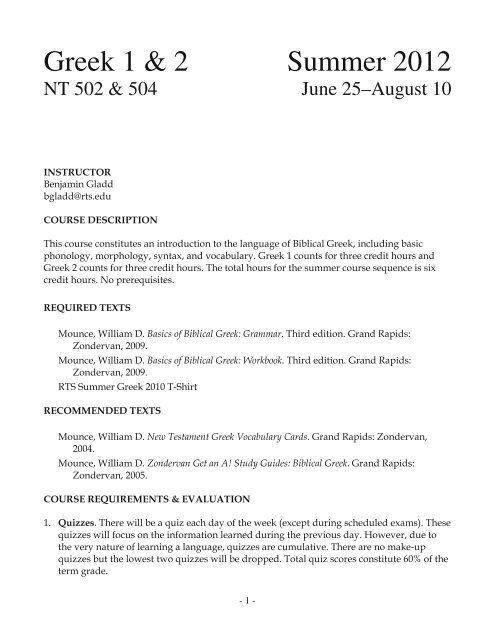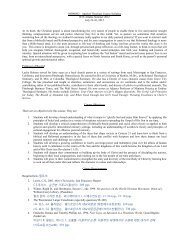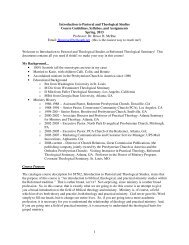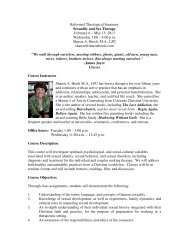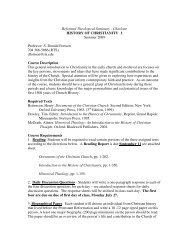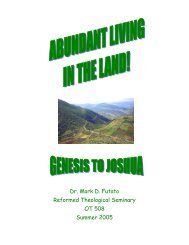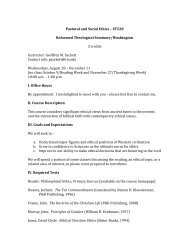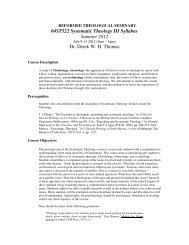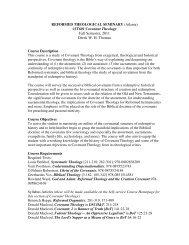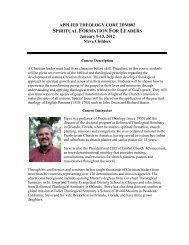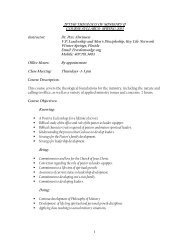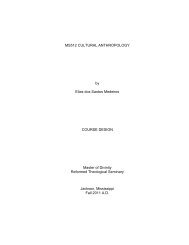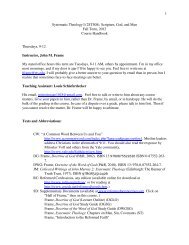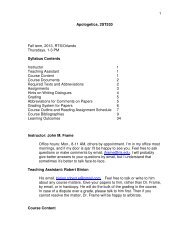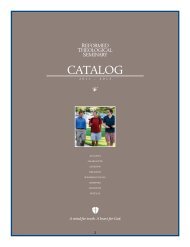Greek 1 & 2 Summer 2012 - Reformed Theological Seminary
Greek 1 & 2 Summer 2012 - Reformed Theological Seminary
Greek 1 & 2 Summer 2012 - Reformed Theological Seminary
You also want an ePaper? Increase the reach of your titles
YUMPU automatically turns print PDFs into web optimized ePapers that Google loves.
<strong>Greek</strong> 1 & 2 <strong>Summer</strong> <strong>2012</strong><br />
NT 502 & 504 June 25–August 10<br />
INSTRUCTOR<br />
Benjamin Gladd<br />
bgladd@rts.edu<br />
COURSE DESCRIPTION<br />
This course constitutes an introduction to the language of Biblical <strong>Greek</strong>, including basic<br />
phonology, morphology, syntax, and vocabulary. <strong>Greek</strong> 1 counts for three credit hours and<br />
<strong>Greek</strong> 2 counts for three credit hours. The total hours for the summer course sequence is six<br />
credit hours. No prerequisites.<br />
REQUIRED TEXTS<br />
Mounce, William D. Basics of Biblical <strong>Greek</strong>: Grammar. Third edition. Grand Rapids:<br />
Zondervan, 2009.<br />
Mounce, William D. Basics of Biblical <strong>Greek</strong>: Workbook. Third edition. Grand Rapids:<br />
Zondervan, 2009.<br />
RTS <strong>Summer</strong> <strong>Greek</strong> 2010 T-Shirt<br />
RECOMMENDED TEXTS<br />
Mounce, William D. New Testament <strong>Greek</strong> Vocabulary Cards. Grand Rapids: Zondervan,<br />
2004.<br />
Mounce, William D. Zondervan Get an A! Study Guides: Biblical <strong>Greek</strong>. Grand Rapids:<br />
Zondervan, 2005.<br />
COURSE REQUIREMENTS & EVALUATION<br />
1. Quizzes. There will be a quiz each day of the week (except during scheduled exams). These<br />
quizzes will focus on the information learned during the previous day. However, due to<br />
the very nature of learning a language, quizzes are cumulative. There are no make-up<br />
quizzes but the lowest two quizzes will be dropped. Total quiz scores constitute 60% of the<br />
term grade.<br />
- 1 -
2. Tests. There will be three major examinations this summer term (see schedule below). All<br />
exams are cumulative. Total exam scores constitute 40% of the term grade (Exam 1 = 10%;<br />
Exam 2 = 10%; Exam 3 = 20% of the total course grade).<br />
3. Class Attendance. Attendance is required. Regular absence or chronic lateness to class will<br />
result in the reduction of the course grade.<br />
COURSE PROTOCOLS<br />
1. Grading Schedule. The letter grading scale for this particular language course is<br />
summarized below. Students must earn at least 80% in each course to pass.<br />
97-100% A+ 87-89% B+<br />
94-96% A 84-86% B<br />
90-93% A- 80-83% B-<br />
0-79% F<br />
2. Attendance. Language acquisition can be a difficult task and requires constant vigilance in<br />
the beginning stages. Because of this, attendance at each class session is essential to the<br />
success of the learning process. Additionally, there are absolutely no make-up quizzes. Neither<br />
will a quiz be administered early. Students may drop their two lowest quiz scores during<br />
the summer term (all seven weeks!). A missed quiz would be considered one of the two<br />
permitted drops for the courses.<br />
3. Electronics. Computers are not permitted in class. Voice recorders are not permitted in<br />
class. Please silence all cell phones during class. Unplug for <strong>Greek</strong>!<br />
4. Seating. Students must sit as close to the front of the class room as possible. No empty<br />
seats between students are permitted. After today (beginning on Tuesday, the second day<br />
of class), students must sit in the same seat for two weeks. Please wear the provided name<br />
tags for the first week of class.<br />
5. Special Needs. In order to ensure full class participation, any student with a disabling<br />
condition requiring special accommodations (e.g. tape recorders, special adaptive<br />
equipment, special note-taking or test-taking needs) is strongly encouraged to contact the<br />
professor at the beginning of the course.<br />
6. Disclaimer. This syllabus is intended to reflect accurately the learning objectives,<br />
instructional format, and other information necessary for students to appraise the course.<br />
However, during the course of the term, the instructor reserves the right to modify any<br />
portion of this syllabus as may appear necessary because of events and circumstances that<br />
obtain during the term.<br />
- 2 -
PROJECTED COURSE SCHEDULE<br />
The following chapter references are to<br />
Basics of Biblical <strong>Greek</strong> Grammar (BBG).<br />
June 25 Syllabus; BBG 1-3<br />
26 Quiz 1-3; BBG 4<br />
27 Quiz 4; BBG 5-6<br />
28 Quiz 5-6; BBG 7<br />
29 Quiz 7; BBG 8-9<br />
July 2 Quiz 8-9; BBG 10<br />
3 Quiz 10; BBG 11<br />
4 No Class – School Holiday<br />
5 Quiz 11; BBG 12<br />
6 Quiz 12; BBG 13<br />
9 Quiz 13; BBG 14<br />
10 Test 1 (BBG 3-14)<br />
11 BBG 15-16<br />
12 Quiz 15-16; BBG 17<br />
13 Quiz 17-; BBG 18-19<br />
16 Quiz 18-19; BBG 20<br />
17 Quiz 20; BBG 21<br />
18 Quiz 21; BBG 22-23<br />
19 Quiz 22-23; BBG 24<br />
20 Quiz 24; BBG 25<br />
23 Quiz 25; Review BBG 3-25<br />
24 Test 2 (BBG 3-25)<br />
25 BBG 26-27<br />
26 Quiz 26-27; BBG 28<br />
27 Quiz 28; BBG 29<br />
30 Quiz 29; BBG 30<br />
31 Quiz 30; BBG 31<br />
August 1 Quiz 31; BBG 32<br />
2 Quiz 32; BBG 33<br />
3 Quiz 33; BBG 34<br />
6 Quiz 34; BBG 35-36<br />
7 Quiz 35-36<br />
8 Study Day<br />
9 Study Day<br />
10 Test 3 (BBG 3-36)<br />
- 3 -
Course: <strong>Greek</strong> I and 2<br />
Professor: Benjamin Gladd<br />
Campus: RTS Jackson<br />
Date: June-August 2011<br />
Course Objectives Related to MDiv Student Learning Outcomes<br />
MDiv* Student Learning Outcomes<br />
In order to measure the success of the MDiv curriculum, RTS has<br />
defined the following as the intended outcomes of the student learning<br />
process. Each course contributes to these overall outcomes.<br />
Articulation<br />
(oral & written)<br />
Scripture<br />
<strong>Reformed</strong><br />
Theology<br />
Broadly understands and articulates knowledge,<br />
both oral and written, of essential biblical,<br />
theological, historical, and cultural/global<br />
information, including details, concepts, and<br />
frameworks.<br />
Significant knowledge of the original meaning of<br />
Scripture. Also, the concepts for and skill to<br />
research further into the original meaning of<br />
Scripture and to apply Scripture to a variety of<br />
modern circumstances. (Includes appropriate use<br />
of original languages and hermeneutics; and<br />
integrates theological, historical, and cultural/global<br />
perspectives.)<br />
Significant knowledge of <strong>Reformed</strong> theology and<br />
practice, with emphasis on the Westminster<br />
Standards.<br />
Rubric<br />
Strong<br />
Moderate<br />
Minimal<br />
None<br />
Minimal<br />
Strong<br />
Minimal<br />
Mini-Justification<br />
1. Learn English grammar while learning <strong>Greek</strong><br />
grammar<br />
1. Working with <strong>Greek</strong> NT Grammar<br />
2. Intro to exegetical skills<br />
1. Discuss the <strong>Reformed</strong> tradition’s view of use of<br />
original languages<br />
Sanctification<br />
Demonstrates a love for the Triune God that aids<br />
the student’s sanctification.<br />
Moderate<br />
1. Scripture memorization in class<br />
2. Why else would someone study Koine <strong>Greek</strong>!<br />
Desire for<br />
Worldview<br />
Burning desire to conform all of life to the Word of<br />
God.<br />
Minimal<br />
1. Better skill with Scripture enhances ability to<br />
conform life to God’s Word.<br />
Winsomely<br />
<strong>Reformed</strong><br />
Preach<br />
Worship<br />
Shepherd<br />
Church/<br />
World<br />
Embraces a winsomely <strong>Reformed</strong> ethos. (Includes<br />
an appropriate ecumenical spirit with other<br />
Christians, especially Evangelicals; a concern to<br />
present the Gospel in a God-honoring manner to<br />
non-Christians; and a truth-in-love attitude in<br />
disagreements.)<br />
Ability to preach and teach the meaning of Scripture<br />
to both heart and mind with clarity and enthusiasm.<br />
Knowledgeable of historic and modern Christianworship<br />
forms; and ability to construct and skill to<br />
lead a worship service.<br />
Ability to shepherd the local congregation: aiding in<br />
spiritual maturity; promoting use of gifts and<br />
callings; and encouraging a concern for non-<br />
Christians, both in America and worldwide.<br />
Ability to interact within a denominational context,<br />
within the broader worldwide church, and with<br />
significant public issues.<br />
Minimal<br />
Minimal<br />
None<br />
minimal<br />
minimal<br />
1. <strong>Greek</strong> I introduces students to the RTS<br />
academic program<br />
1. Occasionally show exegetical and preaching<br />
angles while working on grammar<br />
2. <strong>Greek</strong> grammar ultimately should affect<br />
sermon preparation<br />
*Though all of life is worship. So, studying <strong>Greek</strong><br />
is an act of worship!<br />
1. An increase in ability to read and interpret<br />
Scripture should promote shepherding.<br />
1. An increase in ability to read and interpret<br />
Scripture should promote better interaction with<br />
the world..<br />
- 4 -


